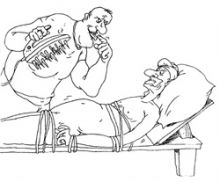The reforms proclaimed by the executive will be ineffective unless we have the eternally sought middle class. Without it no one can guarantee there will be no turning back to the recent past, just as it will be impossible to build a civil society, increase domestic production, and solve the unemployment problem even in part. In fact, forming a middle class does not require hothouse conditions. The state simply must not get in the way of enterprising people going about their legitimate business and making a decent living.
With regard to the Ukrainian middle class, the number one specificity is actually outside any field of endeavor. It is the attitude toward this class of the greater part of the populace, something hardly anyone in the West will be able to understand. In post-industrial society, where the middle class is more often than not a powerful social stratum, serving as a kind of standard for most lower income groups, such an attitude does not exist. Post-totalitarian society presents an altogether different picture. Here, despite the rejection of totalitarian symbols, subconscious notions such as “equality and fraternity” are still very strong, as is scorn for that accursed bourgeoisie, inculcated over decades (despite the fact that most are at the same time firmly resolved to get rich by hook or by crook). Another, perhaps the most paradoxical, special feature of the middle class in Ukraine is, so to speak, the secondary nature of who makes it up as compared to the middle class in the West. While in the West most medium- sized businessmen, managers, etc., are self-made men, in Ukraine the transition period has given birth to a phenomenon that can be described as the incompatibility of form and substance. Take a closer look at those selling things in our countless bazaars. A very large part of them (no one has as yet bothered to determine the percentage) are people with a post-secondary education, former schoolteachers, doctors, engineers, even scientists. We consider them the first sprouts of the middle class and I regard this as a quite optimistic sign.
They are now “shuttle traders” and street vendors because they have no alternative; this is the only thing they can do to earn a living, apart from their profession which no one seems to need in this country. Many of them never make even small-time businessmen. The Ukrainian state, unfortunately, did not lift a finger throughout that transition period, to place any social supports under the changes in the economy. Thrown out of their professional environs, often being topnotch experts in their fields, these people have to take up “business” — or whatever is meant by this word in Ukraine. At this point they encounter a third specific. The attitude to entrepreneurship on the part of the state, which cannot be changed by any administrative reform or reductions in the bureaucracy.
Thus, an anonymous poll carried out among Kyiv’s businesspeople by the commission on small and medium business (chaired by Mykola Heorhiyevsky) of the Ukrainian Union of Industrialists and Entrepreneurs (UUIE), the absolute majority of the respondents are convinced that bribes are the only way to solve whatever problems one has with local authorities. And the widespread technique is not slipping envelopes into bureaucratic pockets but when a small business undertakes to contribute to all kinds of funds like city district development (according to the respondents, this technique is especially favored by city district state administrations, traffic police, tax inspectorates, and labor protection oversight committees). Anonymous as it is, this poll reflects reality (interestingly, all respondents agreed it was necessary to pay taxes, but most had to evade them to survive). One of the bureaucratic inventions is a “socioeconomic development agreement” which, according to businessmen, is often forced on them. Taxpayers are still in the dark about what is being “developed” with the money received under such “agreements” as any degree of transparency with regard to the collecting authorities is out of the question.
Apparently if things like this happen in the capital, under the nose of authorities of all levels, the situation on the regional level cannot be any better. The UUIE supplied The Day with statistics resulting from studies carried out by Kyiv’s International Institute for Sociology, as ordered by USAID and State Committee for Regulatory Reform and Entrepreneurship. Among other things, the data relating to business-state (precisely fiscal and controlling authorities) relationships is quite eloquent. The main problem appears to be that the existing tax system (45.8%), followed by lack or working capital (circulating assets): 12.8%; low effective market demand for their products: 9.8%; inflation and legislation: 6.1% each... Over six months preceding this poll small businesses sustained an average of 7.1 inspections; medium businesses: 13.2; big businesses: 19.4. It is not hard to imagine what such multiple inspections amount to now that an “average Ukrainian” visit of a controlling bureaucrat costs any given business over 180 hryvnias.
Needless to say, it is impossible to quickly untangle all the sophisticated knots of social, social psychological, economic, foreign, and domestic political factors that caused and continue to maintain the ongoing crisis. Yet cadre reshuffling, a habitual top-level bureaucratic tactic inherited from the Soviets, presented as “reform,” cannot make any tangible improvement in the situation. Without doubt, a legal framework for small and medium businesses must be secured at the highest level, along with a guarantee of punishment for wrongdoing on the part of any bureaucrat, at any level, ranging from sanitary inspector to minister. This is the only way to overcome rampant bureaucratic arbitrariness with regard to the middle class making its tentative steps.
The Day carried out a small anonymous poll in one of the capital’s street markets. The question was: “Do you consider yourself a member of the middle class which is being formed?”
Valentyna, age 32:
I am not sure we can rate as medium businessmen, rather lower than medium, in terms of status and incomes.
Halyna Ivanivna:
No one here is if what you understand by the middle class is people with private cars and dachas. I work for 5% a day. I’ve earned about five hryvnias today and the day is almost over. Add it up yourself. I have three children. Two are past their teens and useless and the youngest is 12. Besides. My employer is not too well off herself. She has to run around a lot doing her business. And to get a place in this market costs — well, you can’t even imagine the sum.
Alla:
I am not sure I understand what the middle class actually means. I am a bookkeeper by training, but I don’t like it, so here I am. It’s a temporary job and it doesn’t pay much.
Vladyslav:
I don’t think so. We have a very long way to go to have that middle class.
Liubov Demyanivna:
What do you mean middle class? That’s plain misery. I worked for an institute for twenty years and now here I am selling stuff, rain or snow. It’s not normal. And if things like that happen throughout the country the outcome will be bad.
Petro Dmytrovych:
Middle class perhaps because we are in the middle being squeezed and shoved from all sides.
____________
The above names were offered by the respondents themselves








